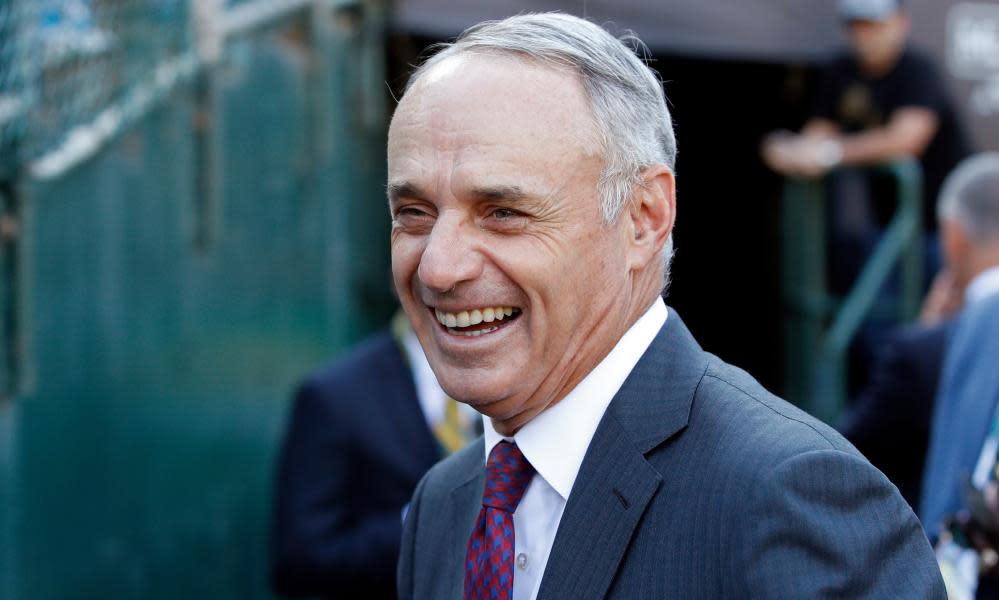Does MLB commissioner Rob Manfred really hate baseball?

There are plenty of duties a sports commissioner is responsible for. Perhaps most important is absorbing nonstop criticism while protecting the various team owners whose interests you actually serve. In that case, Major League Baseball commissioner Rob Manfred has been working overtime as pressure mounts over the decision to push through with a 60-game season in the midst of the coronavirus pandemic. While Manfred may just be following the will of the owners, who are eager to squeeze value out of their franchises after sports were shut down for months, it’s hard not to look at his actions and wonder if his seeming indifference to the game and its players goes beyond just cold-hearted corporatism. To put it bluntly: it doesn’t seem as if Manfred likes baseball at all.
It’s hard to pinpoint exactly when “Rob Manfred Hates Baseball” went from an internet meme meant to mock the commissioner into a working theory to explain his behavior. The criticism began shortly after he took over from Bud Selig who – despite his many, many failures on the job – always came across as someone with a genuine love for the game. Manfred, on the other hand, came in and immediately began pinpointing all the ways that the league needed to improve: the games were too long, the pace too slow, the rules too stuck in the past.
Related: Jim Morris: 'Anything is possible in this life. I’m living proof of that'
For a while, at least, Manfred’s supposed hatred for the game was an amusing talking point, a comically absurd reduction of his nonstop complaining. When he was proposing ideas such as starting extra innings with a runner on second base, it was a great way to couch criticism: “Of course Rob Manfred wants to end extra-inning games as soon as possible, there’s no bigger nightmare for him than more baseball.”
Then came word of Manfred’s quest to ravage baseball’s minor leagues. This was a commissioner who was not here to grow the game: he was running a business and, like many executives who come into a new situation, all he saw were various inefficiencies left behind for him to “fix”. It is unfair to blame the decline of interest in baseball that has occurred during his tenure solely on Manfred, but it is related. If the guy in charge of the sport seems to not give a damn, why should any of us?
As an executive, Manfred seems to have looked at this pandemic as a gift rather than a setback. The very real economic impact of Covid-19 was the perfect excuse for him to go forward with his minor league contraction plan without the pushback he otherwise would otherwise have surely received. The shortened 2020 season is a perfect situation to install his various “improvements”: a National League designated hitter, a three-batter minimum rule for relief pitchers and even the ridiculous extra-inning baserunner idea. Meanwhile, he refused to properly mediate a self-destructive showdown between owners and players, instead stepping in afterward and unliterally imposing the start of the 60-game schedule despite the objections of the MLB players’ association.
Related: Will MLB's battle with the minor leagues deal a blow to America's heart?
His decision to push forward with the season without appearing to care about either the safety of the players or the quality of the on-field product could ultimately prove disastrous. In his attempt to have some kind of season to fulfill the television deals that fund the game (and his $11m a year salary), Manfred is making a dangerous bet. The league’s “strategy” seems to be little more than an exercise in magical thinking: let’s just hope there won’t be too many outbreaks from here until the end of the season.
Yes, MLB has put together some stringent health rules, but no amount of preparation can fully make it safe to play professional baseball given the current climate. While the NBA has its players in a so-called “bubble” at Walt Disney World for the remainder of their season, baseball teams and their much larger rosters travel from location-to-location. Outbreaks are essentially inevitable, as both the Miami Marlins and now the St Louis Cardinals have already had swaths of games suspended after numerous players tested positive.
Some stars have, understandably, opted out for the year, while at least one never even had the chance. While he contracted the virus before participating in MLB activities, Boston Red Sox starting pitcher Eduardo Rodriguez is out with a heart issue most likely due to his battle with the disease, a stark warning of the huge risks that even young, healthy athletes are taking in continuing to play. Let’s be clear about this: while the league can cross its fingers and hope that no player dies on its watch, there is a good chance someone will come out of this with serious long-term health issues.
And if you ask Manfred, it’s not him or the owners he is paid to take the fall for who are to blame for any harm that befalls the players. His reaction to the outbreaks was clear: “the players need to be better. But I am not a quitter in general and there is no reason to quit now.” This is going to be the line from here on out: nothing going forward will be the commissioner’s fault: the plan was foolproof. If the players can’t get through the season, if it has to be shut down then it’s all on them. Maybe Rob Manfred doesn’t hate baseball per se, but he makes it obvious that he doesn’t care much about baseball players.

 Yahoo News
Yahoo News 
